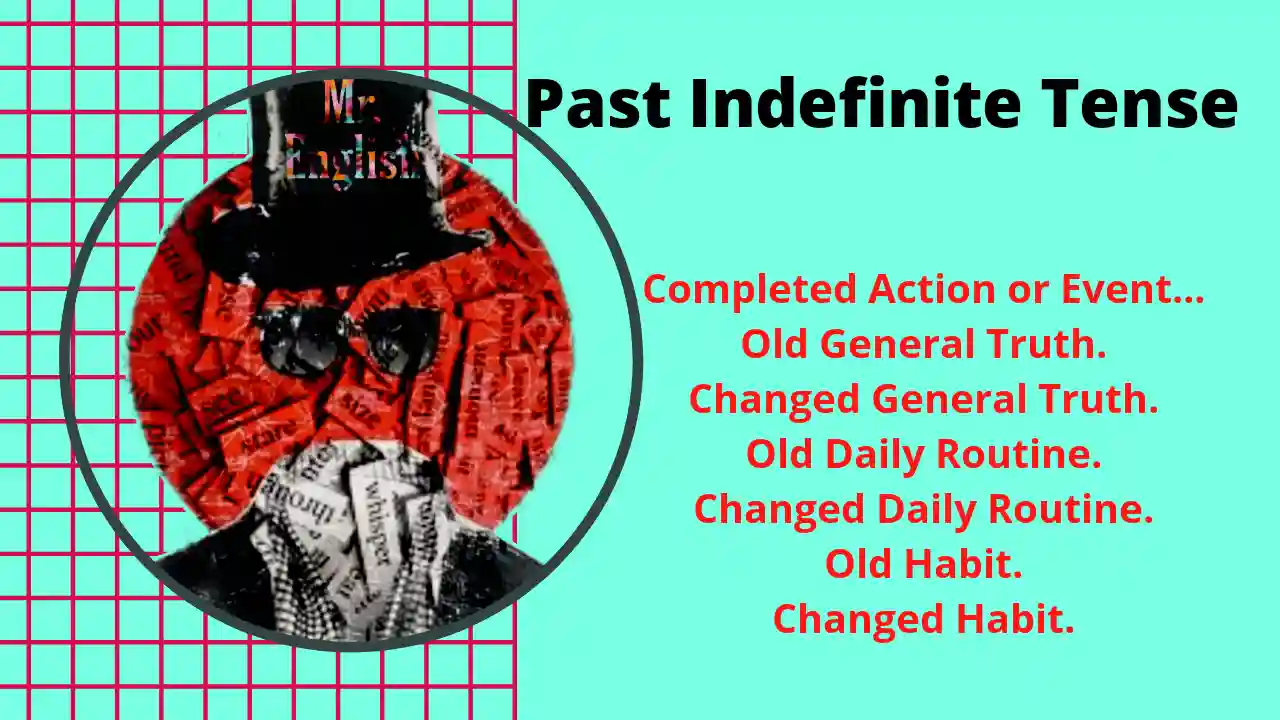
Past Simple
Past Simple Tense is way too much important. We also call this “Past Indefinite Tense” or “Simple Past” Tense. We can use Past Indefinite Tense in place of Present Perfect Tense or Past Continuous Tense.
KJ – What is the definition of Past Simple Tense?
Mr English – Past Simple! The work has finished.
KJ – Ummmm! The definition is based on its name Past Simple. Past means ‘Old, changed, or completed.’ Simple means “easy.” What is more easy than telling a truth!
This is an Action Tense. It means, ‘Old or Changed Truth, Completed Action; and Old or Changed Routine.’
KJ – CONFUSED? TAKE A LOOK BELOW TO UNDERSTAND IT CLEARLY!
Past Simple = When we share any information or detail that is old, not true, or changed in the past; we use Past Simple Tense.
- Old/Changed truth, habit, or routine.
- Completed action or event at a definite time, indefinite time, or with unspecified time.
- We also call it “Preterite Tense or Preterit Tense (in American)”.
Past Simple Rules
- Verb 2nd form OR Did + Verb 1st form = I, He, She, It, We, You, They, This, That, These, Those, There, Here, Singular Noun, or Plural Nouns, etc.
Past Simple Format
- Affirmative = Subject + verb 2nd form + other words.
- Negative = Subject + did + not + verb 1st form + other words.
- Simple Interro = Did + subject + verb 1st form + other words?
- Simple Interro Negative = Did + subject + not + verb 1st form + other words?
- Interrogative = Wh-family + Did + subject + verb 1st form + other words?
- Interrogative Negative = Wh-family + did + subject + not + verb 1st form + other words?
Past Simple Definitions
1. Old/Changed General Truth = When we share any true information or detail that is old or changed, we use Past Simple. A changed truth means the truth is no longer true. An old truth means the truth is old but we do not know “Is it still true or not?”
e.g. –
- Mr English spoke English very well (but now, he does not speak English very well). (Means – Changed General Truth)
- He challenged me and I accepted. Luckily, I won. (Means – Old General Truth but still true.)
Let’s Breakdown!
– He challenged me. (It is still true, “he challenged you in the past.”)
– I accepted. (It is still true, “I accepted in the past.”)
– Luckily, I won. (It is still true, “I won in the past.”)
So, We can also use Present Simple wherever the information or detail is still true = He challenges me and I accept it. Luckily, I win. (Means = General Truth, still true)
- I heard from somewhere that he challenged me. (Means – Old General Truth but not sure “Is it still true on not?”)
- I worked hard (but not anymore). (Means – Changed General Truth.)
- They failed a lot in college exams. (Means – Changed/Old General Truth.)
- We surprised her. (Means – Old General Truth)
- She praised the teachers. (Means – Old General Truth)
- Lord Rama’s stepmother exiled him from Ayodhya. (Means – Old General Truth that is still true.)
2. Old / Changed Daily Routine = When a routine is no longer followed, it has changed or the routine is old, we use Past Simple.
These frequencies often come in sentences = usually, sometimes, never, daily, regularly, often; every year/month/day, every weekend/Summer/Winter, every morning/night; once in a week/month/year, always, fortnightly, hourly, annually, quarterly, constantly, frequently, generally, rarely, occasionally, normally, sometimes, seldom, ever, etc.
e.g. –
- He woke up early in the morning. (Means – Old/Changed Daily Routine.)
- We never cared about this house. (Means – Old/Changed Daily Routine.)
- I frequently brought chocolates for the kids. (Means – Old/Changed Daily Routine.)
- They traveled too much. (Means – Old/Changed Daily Routine.)
- How did you change your lifestyle? (Means – Ask for Old/Changed Daily Routine.)
3. Old / Changed Habit = When a habit is no longer your habit, it has changed or the habit is old, we use Past Simple. Our habit is also our daily routine.
e.g. –
- I consumed sweets a lot when I was a kid. (Means – Old/Changed Habit or Routine.)
- He cried a lot. (Means – Old/Changed Habit or Routine.)
- They stole money once in a while. (Means – Old/Changed Habit or Routine.)
4. Completed action or event at a definite time = When an action or event has been completed but the time that has shown in our action or event is definite (definable) time, we use Past Simple.
e.g. –
- He packed his bag at 8 pm. (Means – Completed action with a definite time.)
- I completed my test 1 hour ago. (Means – Completed action with a definite time.)
- Did you start to learn English 2 years ago? (Means – Ask for Completed action with a definite time.)
Click to know more about Definite Time
5. Completed action or event at an indefinite time = When an action or event has been completed but the time that has shown in our action or event is not definite (undefinable) time, we use Past Simple.
e.g. –
- He packed his bag in the evening. (Means – Completed action with an indefinite time.)
- I completed my test recently. (Means – Completed action with an indefinite time.)
- Did you start to learn English already? (Means – Ask for Completed action with an indefinite time.)
Click to know more about Indefinite Time
6. Completed action or event in unspecified time = When an action or event has been completed and the time is not shown. The time is not specified. We do not need to show time in a sentence. We use Past Simple.
e.g. –
- He packed his bag. (Means – Completed action with an unspecified time.)
- I completed my test. (Means – Completed action with an unspecified time.)
- Did you start to learn English? (Means – Ask for Completed action with an unspecified time.)
That is how we use Past Simple with a definite, indefinite, or unspecified time.
Advice – Never learn any language from a different language. You should learn English in English, not from your native language (mother-tongue). Just like you learned your mother tongue in your own mother tongue. By learning in this way makes your English accurate, fluent, and you learn it quickly.
Thanks for choosing us!


